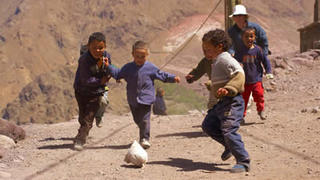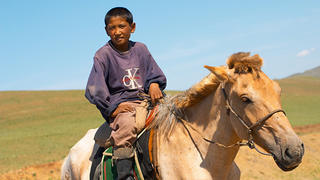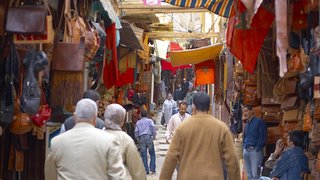
Just two hours drive from the famous souks of Marrakech are the High Atlas Mountains, world famous for trekking adventures and an absolute must see for visitors to Morocco. Our journey took us to Imlil, a small town at the end of the road somewhere near Toubkal. Imlil is surrounded by little communities nestled into the valley, far beyond road access and reached only on foot. For the less energetic among us the option was available to burden a donkey with our backpacks as we headed up the hill in the fading light of the evening. With delight we accepted the offer and by nightfall we were safely tucked away in our Gite - accomodation of the most basic variety.
Sunrise the next morning brought our first proper view of the surrounds. At last we could see where the sound of crashing waterfalls was coming from. High above us the snow capped mountains resisted the sun's early rays, while down below the river ran a furious pace through the valley floor. Outside our Gite a track cuts into the hillside. In places it becomes quite wide, providing enough room for two donkeys to pass each other comfortably.
These sections of track also function for impromptu soccer games with the young boys of the village. At first the rules of the modified game seemed difficult to fathom. We quickly learned that the basic goal is simply to run around after the ball, kicking madly, screaming and yelling and laughing. We joined in the fun and suddenly it all made perfect sense. Our addition of passing the ball between players was a novel addition to the local style and lead to even more squeals of joy by the young lads.
One little fellow, named Hussan, was playing his own rules entirely, and upon getting his foot anywhere near the ball he would eagerly kick it high and wide. His goal was to clear the rocky path edge and send the ball off down the hill. He managed this several times during our short match, but on each occassion several boys would cautiously grab his arms to make sure Hussan himself did not fly off the edge secondarily.
The ball itself was actually a sturdy plastic bag stuffed three quarters full with other plastic bags. It's design ensured a great deal of dampening when kicked, but equally so the ball failed to roll very far when kicked over the side of the path. Most times it would stop where it landed, unable to bounce or roll as a normal soccer ball would. Each time it went over the edge, courtesy of Hussan's efforts, another boy would climb down a few metres and retreive the ball.
A few weeks later we were back in Marrakech and came across some more conventional soccer balls for sale. We contemplated buying a bundle of them and sending them off to Imlil for Hussan and his friends. We decided against it however. Chances are that with one good toe poke such a ball would simply bounce and roll all the way down to the river, never to be seen again. I cant think of a better use for the plastic bags anyway.

